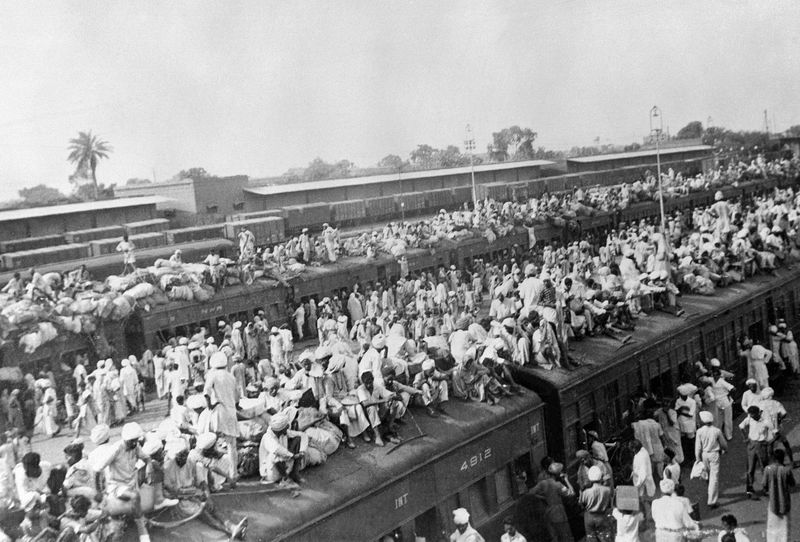The Kashmir Issue: A Key Driver Of India-Pakistan Conflict And The Risk Of War

Table of Contents
Historical Roots of the Kashmir Conflict
The Kashmir conflict's origins lie in the tumultuous partition of India in 1947. The partition, dividing British India into India and Pakistan, left the princely state of Jammu and Kashmir with its predominantly Muslim population, but a Hindu Maharaja, Hari Singh, in a precarious position. This ambiguous situation set the stage for the decades-long dispute.
- The 1947 partition and its impact on Kashmir: The hastily drawn borders of partition failed to account for the complex ethnic and religious demographics of Kashmir, leaving its future uncertain and fueling competing claims from India and Pakistan.
- The role of Maharaja Hari Singh in the accession decision: Initially hesitant, Maharaja Hari Singh ultimately acceded to India after facing a tribal invasion supported by Pakistan, bringing the region under Indian administration. This accession, however, remains a point of contention for Pakistan.
- The first Kashmir war (1947-48) and the UN involvement: The ensuing war between India and Pakistan led to a UN intervention, resulting in a ceasefire and the establishment of the Line of Control (LoC). However, the unresolved status of Kashmir remained.
- The subsequent conflicts of 1965 and 1999 (Kargil War): Further conflicts erupted in 1965 and 1999 (the Kargil War), highlighting the enduring nature of the Kashmir dispute and its potential to trigger major wars between the two nuclear-armed nations. These conflicts further solidified the entrenched positions of both countries regarding Kashmir's status.
Territorial Disputes and Control
The current territorial division is a complex and contested one. The Line of Control (LoC) serves as a de facto border, separating the territories controlled by India and Pakistan. However, the exact demarcation and legal status of this line remain points of significant contention.
- Indian-administered Kashmir (Jammu and Kashmir, Ladakh): India administers the majority of the region, including the areas of Jammu, Kashmir, and Ladakh. However, its control is not absolute due to ongoing insurgency and disputes with Pakistan and China.
- Pakistan-administered Kashmir (Azad Kashmir, Gilgit-Baltistan): Pakistan controls a portion of Kashmir, encompassing Azad Kashmir and Gilgit-Baltistan. Pakistan’s claim over these territories forms a core element of the Kashmir conflict.
- China's claim to Aksai Chin: China's occupation of Aksai Chin, a strategically important region within the historical boundaries of Kashmir, further complicates the territorial picture. This adds another layer to the already multifaceted territorial dispute.
- The Line of Control (LoC) and its significance: The LoC, though not an internationally recognized border, functions as the de facto boundary. Violations along the LoC frequently occur, leading to armed clashes and heightened tensions. It's a volatile border that regularly tests the fragile peace between India and Pakistan.
The Role of Insurgency and Terrorism
The Kashmir conflict has been deeply affected by insurgency and the alleged role of cross-border terrorism. Various militant groups have operated within Kashmir, advocating for independence or accession to Pakistan. The actions of these groups have significantly contributed to the ongoing violence and instability in the region.
- The rise of various militant groups in Kashmir: Over the decades, numerous militant organizations have emerged, employing varying tactics and ideologies in their pursuit of Kashmiri self-determination.
- Cross-border terrorism and its effects: Both India and Pakistan accuse each other of supporting and sponsoring cross-border terrorism. These accusations further exacerbate the conflict and hinder any possibility of peaceful resolution.
- India's counter-insurgency operations: India has deployed extensive security forces to counter insurgency in Kashmir, leading to significant human rights concerns. This has resulted in a complex situation with accusations of human rights abuses on both sides.
- Pakistan's alleged support for militant groups: This remains a highly contentious and sensitive point. India consistently points to Pakistan's support for militant groups, an accusation that Pakistan strongly denies. This lack of consensus hinders meaningful dialogue.
International Involvement and Mediation Efforts
The international community has attempted to mediate the Kashmir conflict, primarily through the United Nations. However, these efforts have largely been unsuccessful, hampered by the deeply entrenched positions of India and Pakistan, and the lack of trust between the two countries.
- The UN Security Council resolutions on Kashmir: Several UN Security Council resolutions address the Kashmir issue, primarily focusing on self-determination for the people of Kashmir. However, the implementation of these resolutions remains stalled.
- Efforts by various countries to facilitate dialogue: Various countries have attempted to broker dialogue between India and Pakistan, often with limited success. These efforts have often been hampered by a lack of trust and the deep-seated historical grievances.
- Obstacles to international mediation: The deep-seated mistrust between India and Pakistan, coupled with their strong nationalistic sentiments regarding Kashmir, poses major obstacles to any external mediation efforts. Both countries are deeply entrenched in their positions and unwilling to compromise on their core interests.
- The role of major powers (e.g., US, China) in the region: Major global powers like the US and China have a significant influence in the region and often play a role, either directly or indirectly, in shaping the dynamics of the Kashmir conflict. Their involvement is crucial to understanding the geopolitical context surrounding the issue.
The Humanitarian Impact of the Kashmir Conflict
The Kashmir conflict has had a devastating humanitarian impact, resulting in significant loss of life, displacement, and widespread human rights violations. The ongoing violence continues to affect the lives and livelihoods of millions of people living in the region.
- The number of casualties over the years: Decades of conflict have resulted in a staggering number of casualties, both civilian and military, creating a persistent climate of fear and uncertainty in Kashmir.
- The impact on civilian populations: Civilians bear the brunt of the conflict, facing displacement, economic hardship, and the constant threat of violence. This situation has led to deep societal trauma.
- Human rights concerns in both Indian- and Pakistan-administered Kashmir: Human rights concerns are raised about both sides of the conflict. Accusations of human rights abuses from both Indian and Pakistani security forces contribute to the cycle of violence and distrust.
- Economic consequences of the conflict: The conflict severely hinders economic development in Kashmir, preventing the region from realizing its full potential. This further fuels resentment and discontent.
Conclusion
The Kashmir conflict remains a deeply complex and volatile issue with far-reaching consequences. Its historical roots, territorial disputes, the involvement of insurgent groups, and the lack of a lasting diplomatic solution continue to pose a significant threat to regional peace and security. Understanding the various facets of the Kashmir conflict, from its historical origins to its contemporary challenges, is crucial for promoting dialogue and working towards a peaceful resolution. Only through sustained international engagement, respectful dialogue between India and Pakistan, and a commitment to addressing the humanitarian concerns can we hope to mitigate the risk of war and find a lasting solution to the Kashmir issue. Further research into the intricacies of the Kashmir dispute is encouraged to foster a deeper understanding of this critical geopolitical challenge.

Featured Posts
-
 Dwp Benefit Checks A Surge In Home Visits
May 08, 2025
Dwp Benefit Checks A Surge In Home Visits
May 08, 2025 -
 Lahwr Myn Py Ays Ayl Trafy Shayqyn Ka Jwsh W Khrwsh
May 08, 2025
Lahwr Myn Py Ays Ayl Trafy Shayqyn Ka Jwsh W Khrwsh
May 08, 2025 -
 Micro Strategy Competitor Analyzing The Hype Surrounding This New Spac
May 08, 2025
Micro Strategy Competitor Analyzing The Hype Surrounding This New Spac
May 08, 2025 -
 Taiwan Investors Retreat From Us Bond Etfs A Shift In Investment Strategy
May 08, 2025
Taiwan Investors Retreat From Us Bond Etfs A Shift In Investment Strategy
May 08, 2025 -
 Analysis The Sharp Rise In Bitcoin Mining This Week
May 08, 2025
Analysis The Sharp Rise In Bitcoin Mining This Week
May 08, 2025
